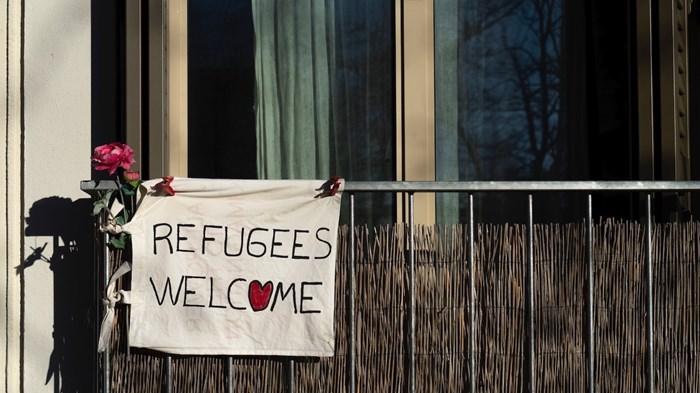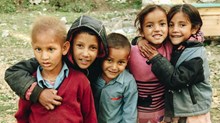Faith Over Fear: How a Persecuted Church Is Rising to Love Its Refugee Neighbors

A large-scale human tragedy unfolded in Afghanistan with the country embroiled in conflict, withdrawal of US troops, an unstable government, and a militant rule that led many families to flee Afghanistan. Not long ago, we saw horrifying images of people clinging on to an Air Force plane in hopes of a better life. Some plunged to their death, never to leave their war-torn land.
According to the UNHCR, the overall situation in Afghanistan has deteriorated since 2021, with significant consequences among the most vulnerable. 3.4 million people are currently internally displaced by conflict. Over 1 million IDPs have returned to their places of origin and 1.6 million new arrivals have been witnessed in neighboring countries. Iran and Pakistan, neighboring countries of Afghanistan, also host some 2.3 million registered Afghan refugees, as well as other Afghans with different statuses. (Source: UNHCR)
Pakistan has been fighting its own inadequacies while taking in refugees—not just since the Afghanistan crisis, but as early as 1979. Pakistan has had 600,000 new arrivals from Afghanistan since 2021. However, Afghan refugees took to the streets there this year to protest the over a year-and-a-half long wait they’ve had to endure for their visas (and resettlement in the United States). The delay in approvals has proved costly for Afghan families struggling to make ends meet, who also deal with a lack of access to work and education and the post-traumatic stress of war (UNHCR).
An uplifting story of light and hope amidst unseen struggles is that of a parachurch organization in Pakistan that is caring for its refugee neighbors from Afghanistan.
A local ministry leader, a true good Samaritan, Samad*, shares his personal ministry experiences of walking alongside the Afghans in their grief, sorrows, and struggles. Samad’s organization “Open House”* welcomed a group of 50 Afghan refugee families to their safe space. He was surprised to learn that they turned out to be professing Christians. They fled to Pakistan in hopes of religious liberty, freedom, and a new life. Their initial hesitancy to disclose their identities was owing to fear, but their faith has kept them going through some of the unimaginable seasons of life. What a testimony of God-breakthroughs in tough terrains!
Samad and his team have been engaged in an open house ministry to men, women and young children for the last 2 years. The spiritual care, counseling, and mentoring Open House has provided have been a balm to wounded souls. While the organization’s initial strategy was to reach out to the majority faith people groups in their own country, God led them to this ministry of compassion, prayer, and hospitality among Afghans.
Samad’s organization is involved in church planting, evangelism, and discipleship. They operate behind closed doors because of security risks. However, they are eager to expand their services and offer peer-to-peer support for young men and their families. Samad is aware of security concerns and says it’s a tough turf to work in. He boldly says that God empowers him and his team to step out in faith. He believes God is working in the heart of Afghan refugees as the local ministry helps them with support in relocation, job training, language skills, and cultural adjustment.
Samad’s ministry is a great example for churches who want to develop robust community engagement models and guidelines (which should include processes and instruction to equip local church members to care and receive their neighbors well).
Why the global Church should be the first line of response: Stepping out in love
The Lord sees and watches over the foreigner – Psalm 149:16
Frontline work in the field can be hard, messy and often underappreciated. In unprecedented times like this, with disasters and wars at stake, the role of the global Church is critical. Churches can be open houses and forts of stability, offering love, empathy, and support for communities in distress. Churches are called to be aware of the needs not only of the local community but also of the global Church. A lived-out faith inspires love in action and bolsters strong ties between the church and the neighbors in the community who seek help.
Church leadership must prayerfully engage their congregations in identifying, caring, and equipping willing members to be involved in Christ-exalting community work—both locally and globally. Extending a hand of friendship, hospitality, and compassion will go a long way in shaping an individual’s future and facilitating healing from trauma.
What we can do: Come together and pray
Samad’s team have worked with small groups over the last 2 years. Small focus groups help the team to have peer-to-peer support and individual care. Samad shares the story of a young man who came as a new believer. Seeing the love demonstrated through Samad’s team and their work, his wife was moved to seek and follow Jesus.
Would we as the Church come together to remember and pray for Samad and the work of the global persecuted Church:
· For safety and protection for Samad and his team as they work among the Afghan people group while facing security risks.
· For wisdom and strength as they train local believers to live out the faith.
· For Open Doors to reach out to families in need.
· For scores of Afghan families who dream of a better life and opportunities (employment, training, etc.).
· For us to be a sensitive, caring, and compassionate community to welcome the stranger at the table.
While this young leader faces a risk to his life, the love of Christ compels him to step into the unknown and share that love with people uprooted and in unfamiliar terrain.
Beyond international relief and humanitarian efforts, there is no doubt that God is still at work as small-scale ministries continue to toil, serve, and testify of God’s work in the dark, unseen places.
*Names of both the organization and the leader have been changed to protect their identities.
Joanna Dhanabalan is an alum of HDI’s MA in Humanitarian and Disaster Leadership program and works as Director of Communications at Outreach. Her faith drives her vocation and her calling to serve communities in the unseen. She is involved in Global Diaspora ministries working among young professionals, refugees and immigrants in Chicagoland.
The Better Samaritan is a part of CT's
Blog Forum. Support the work of CT.
Subscribe and get one year free.
The views of the blogger do not necessarily reflect those of Christianity Today.




















